
VirginAirbusA3501000
For a moment last week, it seemed we were back in the good old days of young rebel Richard Branson taking on the established Lord King, as Virgin Atlantic tried to end the monopoly of British Airways. Times have changed, Branson has been succeeded by Shai Weiss and Willie Walsh has taken the role of King, but the tune of the song is the same: Virgin Atlantic takes on BA and its parent International Airlines Group (IAG).
On September 18, Virgin unveiled plans on how to counter BA’s monopoly at London Heathrow. The full-service airline vies to become the UK’s number 2 by expanding its network, domestically, intra-Europe and long haul. The plan comes at a moment when the UK-government is reviewing the competitive position of London’s number 1-airport, including the allocation of its precious slots. That review has everything to do with Heathrow’s planned third runway, which after half a century of planning and heated debate still needs confirmation.
Virgin says that IAG-airlines have dominated Heathrow too much for too long. It claims 55 percent of all slots have been allocated to its airlines, with British Airways the biggest user. No other airline holds more than five percent of the slots. The effect has been seen on September 9 and 10 when BA’s pilots went on strike for the first time and brought the airline’s operations almost to a complete standstill. “Britain, and those who travel to it, deserve better than this. Air passengers need a choice and Virgin Atlantic is ready to deliver when Heathrow expands”, Weiss said.
In order to deliver Virgin, needs two major changes at Heathrow. It wants the review of slot allocation to work to its benefit and set things straight by becoming Britain’s second flag carrier.
The other opportunity it seeks is the third runway that opens up extra capacity at Heathrow. “The third runway is a once in a lifetime opportunity to change the status quo and create a second flag carrier”, Weiss says. “Changing the way take-off and landing slots are allocated for this unique and vital increase in capacity at the nation’s hub airport will create the right conditions for competition and innovation to thrive.”
What will Virgin Atlantic do, once it has got the slots and capacity it wishes? It plans to add 84 new destinations to the current 19 long haul routes, making 103 in total. Following the take-over of Flybe together with a consortium of Connect Airways and Stobart, the UK-domestic network will grow by 12 new destinations: Aberdeen, Exeter, Inverness, Manchester, Belfast City, Guernsey, Liverpool, Newcastle, Edinburgh, Glasgow, Jersey, and Newquay.
The European network will grow by 37 destinations, including Amsterdam, Barcelona, Madrid, Dublin, Frankfurt, Vienna, Lisbon, and Istanbul.
The worldwide long haul network will also see 37 new routes. Virgin’s current network is predominantly concentrated on the US East and West coast, while also serving Shanghai, Hong Kong, Mumbai, Delhi, Sao Paolo, and Johannesburg. Planned destinations include Abu Dhabi, Jakarta, Singapore, Sydney, Auckland, Beijing, Tokyo, Moscow, Buenos Aires, Santiago as well as Toronto and other routes to North and South America, and Africa.
Massive fleet ramp-up needed
An aggressive strategy such as Virgin’s needs a massive ramp-up of its fleet, which currently includes 45 aircraft: 17 Boeing 787-9s, 10 Airbus A330-300s, 4 A330-200s, plus 8 A340-600s and another 8 Boeing 747-400s that will be replaced by new-generation aircraft as the A350-1000 and A330-900. Virgin took delivery of its first two of 12 -1000s this summer, with 14 A330-900s to join the fleet from 2024 and 6 more on option.
Expect a follow-on order on its long haul-fleet if Virgin wants to execute its expansion plan. For its domestic operations, it can rely on Flybe’s Bombardier Dash8 Q400s and Stobart’s Embraer-fleet for a while. If Virgin really wants to take on IAG within Europe, it needs to go shopping soon to build itself a short- to medium-haul fleet.
This is where various question marks come into the equation. Virgin needs to take the first hurdle by getting the slot allocation-process at Heathrow to be changed fundamentally. Expect a long and hard battle with IAG to defend its current dominant position. Hurdle number 2: the strategy is very much depending on Heathrow’s third runway. If history is something to go by, that’s a very long battle. In a world more and more talking about climate change, the first take-off of an airliner from a new piece of concrete in London is still something in the distant future.
Hurdle number 3: without number 1 and 2 settled, Virgin is unlikely to commit to ordering extra aircraft. If it wishes to do sooner rather than later, it finds the likely candidates from Boeing and Airbus sold-out for the next five years, unless it sources aircraft elsewhere.
In all, this seems to make Virgin Atlantic’s plan very much a long shot.
Update: on September 27, Virgin Atlantic said it is interested in the slots used by Thomas Cook at Manchester to reinforce its position in North England. The airline wishes to fly some 30.000 extra passengers already next Winter.
Views: 11





